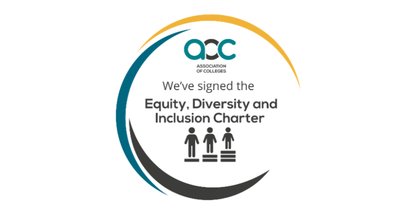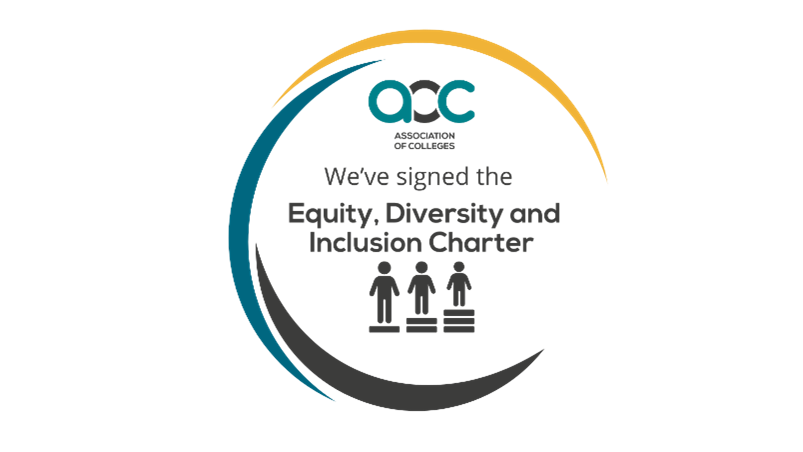Abingdon & Witney College provide an environment that is inclusive and where all feel safe and valued.
We want all our students and staff to enjoy their time at Abingdon & Witney College and feel like they can just be themselves, without having to worry about judgement or bullying.
Key to our mission of changing lives and communities is removing barriers to learning with us and working with us, whatever they may be, and promoting a positive and tolerant environment for everyone.
Some of the initiatives we have started and projects from others that we promote include:
- Student Voice – a representative body run by students, for the students
- LGBTQAI+ - pronoun badges, rainbow lanyards, focus groups, preferred names on ID, student surveys and feedback forms, Student Curriculum Leads
- In-house training for staff on equality, diversity and inclusion
- Ready, Respectful, Safe – what we ask all our students and staff to be whilst on campus, to themselves and each other
- The amazing support teams we have, covering Special Educational Needs and Disabilities (SEND), autism, young carers and many other specialist areas.
- The adoption of the IHRA definition of antisemitism What is antisemitism? | IHRA (holocaustremembrance.com) as a guide to interpreting and understanding antisemitism.

EDI Charter
Abingdon & Witney College is a signatory of the Association of Colleges’ Equity, Diversity and Inclusion (EDI) Charter. We are committed to building a culture of belonging and are dedicated to working with all our staff and students to embed inclusivity across the college.

Equality Objectives
We also follow the guidelines as laid out by the public sector equality duty, and have set ourselves specific Equality Objectives as a college. You can read our equality objectives and view our equality data here Reports and Resources - Abingdon & Witney College (abingdon-witney.ac.uk)
The Equality Act
The public sector equality duty is made up of a general equality duty supported by specific duties which is set out in section 149 of the Equality Act 2010.
The general equality duty applies to ‘public authorities’. Those subject to the general equality duty must, in the exercise of their functions, have due regard to the need to:
- eliminate unlawful discrimination, harassment and victimisation and other conduct prohibited by the Act
- advance equality of opportunity between people who share a protected characteristic and those who do not
- foster good relations between people who share a protected characteristic and those who do not.
The Equality Act explains that the aim of advancing equality of opportunity involves, in particular, having due regard to the need to:
- remove or minimise disadvantages suffered by people due to their protected characteristics
- take steps to meet the needs of people with certain protected characteristics where these are different from the needs of other people
- encourage people with certain protected characteristics to fully participate including activities where their participation is disproportionately low.
Protected characteristics are:
- age
- disability
- gender reassignment
- marriage and civil partnership
- pregnancy and maternity
- race
- religion or belief
- sex
- and sexual orientation
It states that meeting different needs includes (among other things) taking steps to take account of disabilities, including mental health. It describes fostering good relations as tackling prejudice and promoting understanding between people from different groups. It explains that compliance with the general equality duty may involve treating some people more favourably than others.
In summary, each listed public sector authority including the college is required to:
- Publish information to demonstrate its compliance with the general equality duty. This information must include, in particular, information relating to people who share a protected characteristic who are:
• its employees, and;
• people affected by its policies and practices i.e. the College’s students. - Prepare and publish one or more objectives needed to further any of the aims of the general equality duty.
Both the equality information and the equality objectives must be published in a manner that is accessible to the public.
The Gender Pay Gap Report
Gender Pay Gap reporting requires employers with 250 or more employees to publish statutory calculations each year showing the pay gap between male and female employees. Read the latest version here Reports and Resources - Abingdon & Witney College (abingdon-witney.ac.uk)




















